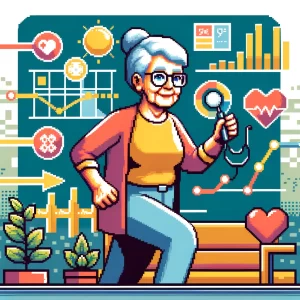
How to Spot Reliable Health Information on Social Media: A New Guide from Experts
In a world where social media feeds us everything from cat videos to life-saving health tips, knowing what information we can trust is crucial. Many of us turn to platforms like Instagram, Twitter (or X 🙄), or Facebook for health advice, but how often do we stop to think about the credibility of that information? A recent study dives deep into the topic, revealing the criteria we should consider to determine what’s trustworthy.
The study ranked 17 criteria for assessing the quality of health information on social media, gathering insights from experts to guide us in making informed choices. The findings? Accuracy, credibility, and reliability took the top spots as the most important indicators of trustworthy health information, while factors like originality and the sheer amount of data ranked lower.
In this blog, we’ll explore why these criteria matter and how they can empower public health practitioners and everyday users alike to navigate the world of online health information more confidently.
Why Social Media for Health Information?
Social media has become one of the main channels for health communication. In fact, over 60% of people reportedly turn to these platforms as their first stop for health information. Social media offers easy access to diverse opinions, expert advice, and even personal stories from individuals facing similar health issues. This democratization of health information has empowered many people to become more proactive about their health.
However, the vast reach of social media also makes it a breeding ground for misinformation. Misleading information can have real-life consequences, especially when it relates to serious health conditions. So, how can you ensure you’re getting credible health information online? This new research offers a roadmap to help us answer that question.
Key Criteria for High-Quality Health Information
The study’s researchers employed a two-step process: they first reviewed previous studies to compile a list of quality criteria, then surveyed experts to rank these criteria. Here’s what they found to be most important:
1. Accuracy
- The top priority according to experts, accuracy refers to how correct and reliable the information is. Inaccurate information can mislead people and, in some cases, even endanger lives. For instance, during the COVID-19 pandemic, accurate health information became a literal lifesaver, underscoring the need for high standards in information shared online.
2. Credibility
- Closely linked to accuracy, credibility is all about whether the source of information is trustworthy. Health information shared by reputable institutions like the CDC or the World Health Organization (WHO) is generally more credible than advice from an unknown user. Credibility also involves disclosure of conflicts of interest, showing that a hidden agenda don’t bias the information provider.
3. Reliability
- Consistency in the information provided adds to its reliability. Reliable sources regularly update their information and avoid sensationalizing facts. Think of it like going to the same doctor for years versus visiting different doctors who give conflicting advice.
These three criteria form the core of high-quality health information. The study suggests that if an article or post checks these boxes, it’s likely worth trusting. Other factors, such as the originality of the information, ranked lower on the list, suggesting that while fresh perspectives are welcome, they’re not as critical as credibility and accuracy.
The Role of Public Health Practitioners
This research highlights the importance of transparency and accountability in social media communications for public health professionals. When public health agencies share information, ensuring it meets these top three criteria can build trust and enhance community engagement. This is especially important when trying to counteract misinformation spread by non-experts or unreliable sources.
Health professionals can also use these findings to educate their audiences. For example, they can guide individuals on how to assess the credibility of online health content, providing simple checklists based on the top criteria outlined here.
Practical Tips for Evaluating Health Information on Social Media
To help you identify trustworthy health information on social media, here are some practical tips:
- Check the Source: Is the information coming from a well-known health organization or a verified medical expert? Look for established sources with a history of credibility.
- Look for Evidence: Trustworthy health information often includes references to studies or data. While you don’t need to read every source, the presence of references shows the provider values evidence-backed information.
- Watch Out for Emotional Language: Sensationalized or overly emotional language can be a red flag. Reliable health information tends to be straightforward, focusing on facts rather than stirring emotions.
- Verify Consistency Across Sources: If you find the same information from multiple credible sources, it’s more likely to be reliable. Misinformation often lacks consistent support across trustworthy outlets.
These strategies can serve as your toolkit for filtering out unreliable information, helping you make health decisions based on solid facts rather than hype.
Why This Research Matters
In an era of “fake news” and rapid information sharing, the credibility of health information on social media has become a public health issue. Experts are urging social media companies, public health organizations, and individuals alike to prioritize quality control. This study’s findings can also help guide policy changes aimed at holding platforms accountable for the information they host, ultimately leading to a safer online space for health information seekers.
This research sheds light on a reality we’ve all experienced: not everything on social media is as it seems. Knowing what criteria matter most allows us to discern which information to take seriously and which to dismiss. As individuals, public health practitioners, and information consumers, we can all play a part in ensuring social media becomes a source of reliable, accurate health information rather than a vessel for misinformation.
Join the Conversation
- Have you ever encountered health information on social media that turned out to be misleading? How did you handle it?
- What do you think social media companies can do to help reduce misinformation on their platforms?
Join the Community – Get Your Weekly Public Health Update!
Be a health leader! Subscribe for free and share this blog to shape the future of public health together. If you liked this blog, please share it! Your referrals help This Week in Public Health reach new readers.



